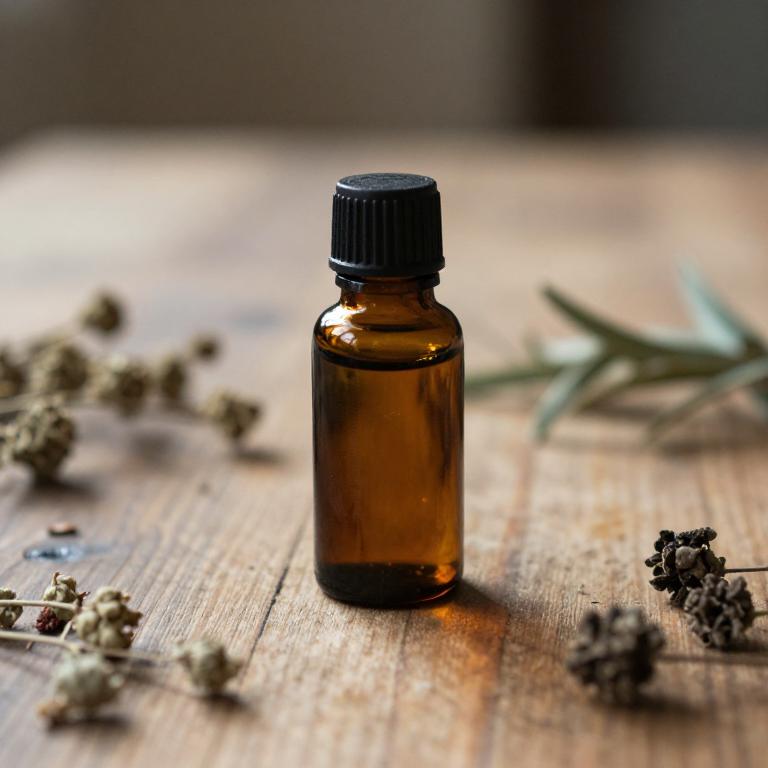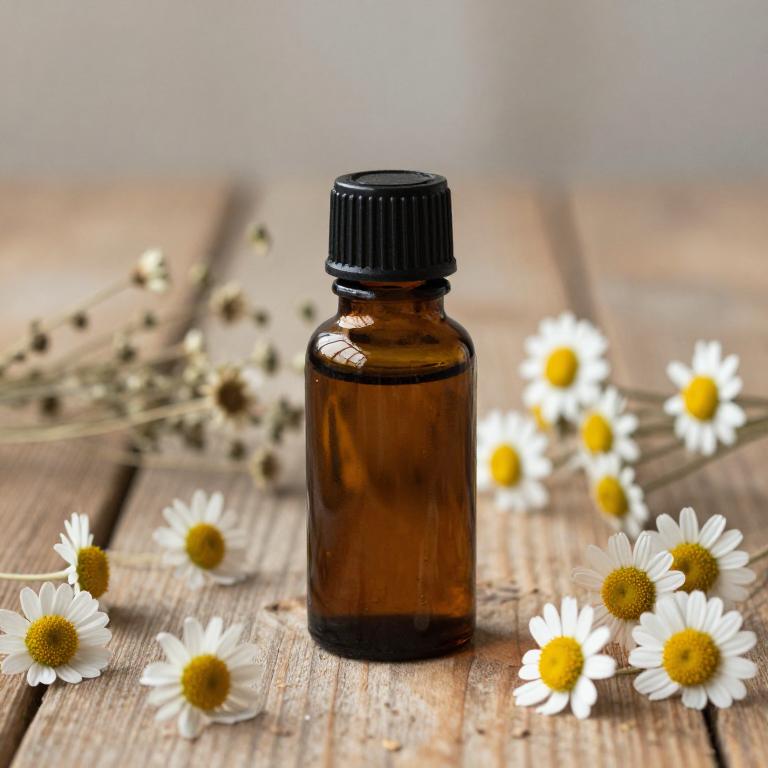10 Best Herbal Essential Oils For Itchy Skin

Herbal essential oils such as lavender, chamomile, and peppermint are commonly used to alleviate itchy skin due to their soothing and anti-inflammatory properties.
These oils can be diluted with a carrier oil and applied topically to reduce irritation and promote skin healing. Lavender oil is particularly effective for its calming effects, while chamomile is known for its gentle soothing properties. Peppermint oil can provide a cooling sensation that helps ease the discomfort of itching.
However, it is important to perform a patch test before use and consult a healthcare professional, especially for individuals with sensitive skin or existing skin conditions.
Table of Contents
- 1. Melaleuca (Melaleuca alternifolia)
- 2. English lavender (Lavandula angustifolia)
- 3. Eucalyptus (Eucalyptus globulus)
- 4. Ceylon cinnamon (Cinnamomum zeylanicum)
- 5. Rosemary (Rosmarinus officinalis)
- 6. Lemon grass (Cymbopogon citratus)
- 7. Ginger (Zingiber officinale)
- 8. Turmeric (Curcuma longa)
- 9. Thyme (Thymus vulgaris)
- 10. German chamomile (Chamomilla recutita)
1. Melaleuca (Melaleuca alternifolia)

Melaleuca alternifolia, commonly known as tea tree oil, is a popular essential oil derived from the leaves of the Melaleuca alternifolia plant native to Australia.
It is widely recognized for its antimicrobial and anti-inflammatory properties, making it a valuable natural remedy for itchy skin caused by conditions such as eczema, psoriasis, or fungal infections. When diluted properly with a carrier oil, tea tree oil can help soothe irritation and reduce redness, offering relief from persistent itching. Its ability to combat bacteria and fungi makes it particularly effective for treating skin infections that contribute to itchiness.
However, it is important to use it cautiously and consult a healthcare professional before applying it to sensitive or broken skin.
2. English lavender (Lavandula angustifolia)

Lavandula angustifolia, commonly known as English lavender, is widely recognized for its calming and therapeutic properties, making its essential oil a popular choice for soothing itchy skin.
The oil contains compounds such as linalool and linalyl acetate, which have anti-inflammatory and antimicrobial effects that can help reduce irritation and redness. When diluted properly with a carrier oil, lavender essential oil can be applied topically to relieve the discomfort of conditions like eczema, psoriasis, or insect bites. Its pleasant aroma also has a calming effect, which can help ease the stress often associated with itchy skin.
Overall, lavender essential oil is a versatile and effective natural remedy for managing itchy skin when used safely and appropriately.
3. Eucalyptus (Eucalyptus globulus)

Eucalyptus globulus, commonly known as Australian eucalyptus, is a popular source of herbal essential oils used for its soothing and anti-inflammatory properties.
The essential oil is derived from the leaves of the plant through steam distillation, capturing its aromatic and therapeutic compounds. It is often used to alleviate itchy skin due to its ability to reduce inflammation and provide a cooling sensation. The presence of compounds like cineole and limonene contributes to its antiseptic and analgesic effects.
When diluted properly, eucalyptus globulus essential oil can be safely applied to the skin to offer relief from irritation and discomfort.
4. Ceylon cinnamon (Cinnamomum zeylanicum)

Cinnamomum zeylanicum, commonly known as cinnamon bark, produces a warming and aromatic essential oil that is often used for its potential soothing properties on itchy skin.
The oil contains compounds like cinnamaldehyde and eugenol, which may help reduce inflammation and provide a calming effect on the skin. When diluted properly with a carrier oil, cinnamon essential oil can be applied topically to alleviate irritation and redness associated with conditions like eczema or insect bites. However, due to its strong potency, it should always be used with caution and tested for skin sensitivity before regular use.
Despite its benefits, cinnamon essential oil is not a substitute for medical treatment and should be used as a complementary therapy under professional guidance.
5. Rosemary (Rosmarinus officinalis)

Rosmarinus officinalis, commonly known as rosemary, is a popular herb whose essential oil is widely used for its therapeutic properties, including its ability to soothe itchy skin.
The essential oil contains compounds like camphor and pinene, which have anti-inflammatory and antiseptic qualities that help reduce skin irritation and redness. When diluted properly, rosemary essential oil can be applied topically to alleviate itchiness caused by conditions such as eczema or fungal infections. Its stimulating aroma also promotes relaxation, making it a valuable addition to skincare routines.
However, it is important to perform a patch test before use and consult a healthcare professional, especially for those with sensitive skin or existing skin conditions.
6. Lemon grass (Cymbopogon citratus)

Cymbopogon citratus, commonly known as lemon grass, is a popular herb used to produce essential oils that are beneficial for itchy skin.
The essential oil derived from this plant contains compounds like citral and geraniol, which have natural antiseptic and anti-inflammatory properties. These properties make it effective in soothing irritated skin and reducing itching caused by conditions such as eczema or insect bites. When diluted with a carrier oil, lemon grass essential oil can be safely applied topically to provide relief.
Its refreshing aroma also has a calming effect, enhancing the overall comfort of the skin.
7. Ginger (Zingiber officinale)

Zingiber officinale, commonly known as ginger, is a popular herb used in the production of essential oils that may provide relief for itchy skin.
The essential oil derived from ginger contains bioactive compounds such as gingerol and shogaol, which have anti-inflammatory and analgesic properties. When applied topically, ginger essential oil can help reduce skin irritation and soothe itching by calming the nervous system and reducing inflammation. However, it is important to dilute the oil with a carrier oil before applying it to the skin to avoid irritation.
While some individuals may find it beneficial, it is recommended to perform a patch test first and consult with a healthcare professional, especially for those with sensitive skin or existing skin conditions.
8. Turmeric (Curcuma longa)

Curcuma longa, commonly known as turmeric, is a well-known herb that contains curcumin, a compound with potent anti-inflammatory and antioxidant properties.
Essential oils derived from Curcuma longa have been used traditionally for their soothing effects on the skin, particularly for relieving itchiness caused by conditions such as eczema or psoriasis. These essential oils can be diluted with a carrier oil and applied topically to reduce redness, irritation, and discomfort associated with itchy skin. However, it is important to perform a patch test before using turmeric essential oil to avoid potential allergic reactions.
When used appropriately, Curcuma longa essential oil can be a natural and effective remedy for managing itchy skin.
9. Thyme (Thymus vulgaris)

Thymus vulgaris, commonly known as thyme, is a herb widely used in aromatherapy and natural medicine for its therapeutic properties.
Its essential oil, derived from the leaves and flowers of the plant, contains potent compounds like thymol and carvacrol, which possess strong antifungal, antibacterial, and anti-inflammatory effects. These properties make thymus vulgaris essential oil particularly effective in alleviating itchy skin caused by fungal infections, bacterial irritations, or inflammatory conditions. When diluted properly with a carrier oil, it can be applied topically to soothe and calm irritated skin.
However, it is important to perform a patch test first, as some individuals may experience sensitivity or allergic reactions to this powerful essential oil.
10. German chamomile (Chamomilla recutita)

Chamomilla recutita, commonly known as German chamomile, is a popular herbal source for essential oils used to alleviate itchy skin.
The essential oil derived from its flowering tops contains compounds like bisabolol and chamazulene, which possess anti-inflammatory and antiseptic properties. These components help reduce skin irritation, redness, and itching by soothing the skin's inflammatory response. Due to its calming effects, chamomile essential oil is often used in topical applications such as creams, lotions, and salves for conditions like eczema and psoriasis.
When properly diluted, it can be a safe and effective natural remedy for providing relief from persistent skin itching.